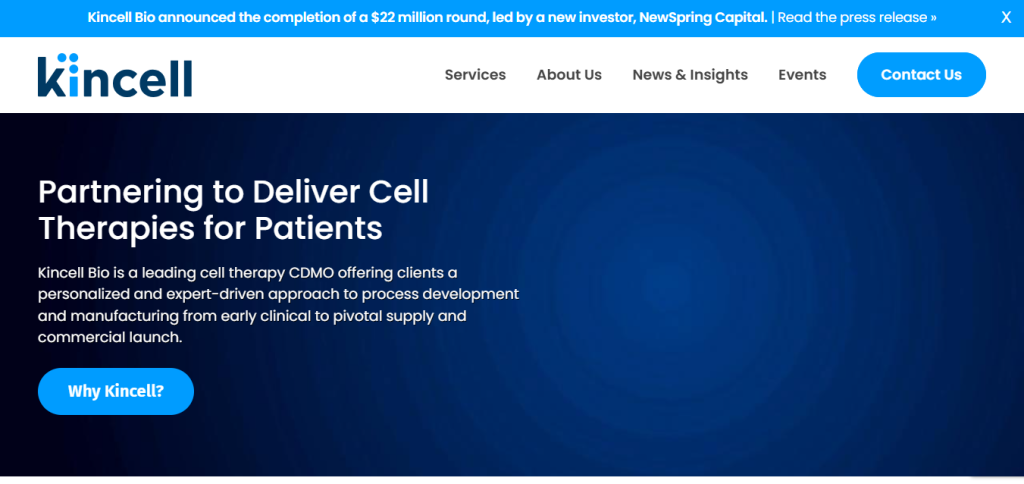Kincell Bio Secures $22M to Build the Future of Cell Therapy Manufacturing
July 14, 2025
byFenoms Startup Research

Kincell Bio has raised $22 million in fresh funding to transform the landscape of cell therapy manufacturing with a model that blends innovation, scalability, and patient-centric delivery. The round was led by NewSpring, and is set to position Kincell Bio as a critical enabler in the booming field of advanced therapeutics.
The funding marks a major milestone for Mark Bamforth, a veteran biotech entrepreneur known for founding and exiting multiple successful CDMOs (Contract Development and Manufacturing Organizations), including Brammer Bio and Arranta Bio. With Kincell Bio, Bamforth is zeroing in on the next wave of biomanufacturing: scalable, decentralized solutions tailored for personalized cell therapies.
What Kincell Bio Does
Kincell Bio provides end-to-end cell therapy manufacturing services, offering a streamlined path from R&D to clinical and commercial-scale production. This includes process development, quality control, regulatory support, and GMP-compliant manufacturing environments, all customized for the nuanced requirements of autologous and allogeneic therapies.
What sets Kincell apart is its commitment to being "site-agnostic" - meaning it supports manufacturing at the client’s facility, at its own facility, or via distributed models. In an industry where time, compliance, and logistics can make or break therapies, Kincell’s flexible architecture removes roadblocks for biotech firms and accelerates time to market.
And it’s in that flexibility where the strategic edge begins to surface. In an industry racing toward more personalized medicine, founders building in biotech must rethink not just how therapies are developed - but how they’re delivered at scale. The model of a single, massive facility no longer matches the distribution needs of cell therapies with short shelf lives and tight treatment windows. Kincell’s approach creates a reproducible, modular manufacturing framework - one that doesn’t force startups to choose between speed and compliance.
For biotech founders, the deeper insight here is this: the infrastructure you build into your go-to-market strategy is just as critical as the science behind your therapy. It’s not enough to prove efficacy in the lab - you have to prove that your therapy can be made safely, repeatedly, and anywhere it’s needed. Investors are no longer just evaluating your molecule - they’re evaluating the blueprint of your manufacturing model.
What sets Kincell apart is its commitment to being "site-agnostic" - meaning it supports manufacturing at the client’s facility, at its own facility, or via distributed models. In an industry where time, compliance, and logistics can make or break therapies, Kincell’s flexible architecture removes roadblocks for biotech firms and accelerates time to market.
Why It Matters Now
The timing of this funding could not be more strategic. The global cell therapy market is projected to reach $48.2 billion by 2030, growing at a CAGR of over 14%, driven by surging investments in gene editing, personalized medicine, and regenerative therapeutics.
Yet while clinical breakthroughs continue to make headlines, the industry’s bottleneck is clear: manufacturing capacity and flexibility. Traditional CDMOs often struggle to adapt to small-batch, high-complexity therapies that require stringent controls and fast turnaround.
This is where Kincell Bio is making its move. With its modular, responsive infrastructure, the company is offering biotech startups and established players alike the ability to scale smarter - not just bigger.
Kincell Bio offers a blueprint for how to scale in this new reality - without relying on outdated, rigid facilities.
Who’s Behind the Round
The round was led by NewSpring, a growth-focused firm that backs high-potential companies in the healthcare and life sciences sectors. With their strong track record in scaling operationally intensive startups, NewSpring’s involvement sends a clear signal that Kincell is building for long-term infrastructure dominance in the space.
Mark Bamforth, who previously founded and exited Brammer Bio (acquired by Thermo Fisher) and Arranta Bio (acquired by Recipharm), brings unmatched operational experience and investor trust. His return with Kincell Bio isn’t just another startup story - it’s a bet on decentralizing the next generation of biologics production.
Industry Outlook
The cell and gene therapy (CGT) CDMO market alone is projected to surpass $15 billion globally by 2028, according to Data Bridge Market Research. Industry leaders like Novartis and Gilead have publicly acknowledged that manufacturing speed and flexibility are now core differentiators, not just cost centers.
Additionally, GMP-compliant decentralized models are gaining traction, particularly in the wake of COVID-19, which exposed the fragility of centralized supply chains. With regulatory bodies increasingly supporting innovative manufacturing models, companies like Kincell stand to benefit from both regulatory tailwinds and market demand.
There’s also growing regulatory support. The FDA has recently introduced guidelines to support decentralized and distributed manufacturing for advanced therapies, provided quality standards and traceability are upheld. This shift creates a regulatory green light for companies like Kincell that design compliant, multi-site frameworks from day one.
What’s Next for Kincell Bio
With fresh capital in hand, Kincell Bio plans to expand its infrastructure, recruit top scientific and operational talent, and deepen its client service capabilities. The team will also focus on automation and digitization, two critical pillars that will allow Kincell to scale quality control and compliance across facilities.
The team will also focus on supporting emerging biotechs, giving founders a clear path from preclinical discovery to bedside delivery - without needing to reinvent their production model at each stage.
The company is expected to support both early-stage biotech firms and mid-to-late stage therapeutics companies navigating clinical trials, tech transfers, and commercial preparation.
The endgame? To become the default partner for scalable, decentralized, patient-ready cell therapy manufacturing - without the traditional constraints of geography, volume, or facility ownership.









